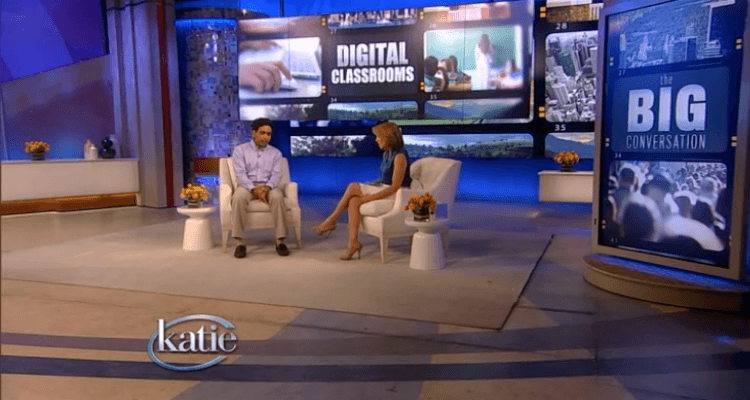This morning, Katie Couric met with Sal Khan, Founder and Executive Director of Khan Academy, and talked about the free online education platform and why it’s revolutionary.
In 2009, Khan quit his job and started a not for profit company, Khan Academy. Supporters didn’t back him immediately, but by the summer of 2010, Bill Gates was speaking at the Aspen Ideas Festival talking about Khan Academy being one of the things he’s excited about. Two weeks later they were meeting, and the Gates Foundation is now a major supporter of Khan Academy, in addition to Google, and others.
The site currently houses 5,000 videos, but Khan says “that’s not the meat of what Khan Academy is.” It’s an interactive platform that provides unlimited practice and feedback for students, and tools for teachers. The content touches on many subjects, with math and science content covered comprehensively. Eventually, the goal is to cover all subjects in the same way.
It all started on YouTube
Khan and his sister were raised by a single mother in Louisiana where he attended a regular brick and mortar school. His sister was a strong student, and he accredits her as an educational role model. His educational career then led him to the Massachusetts Institute of Technology (MIT), graduating with three degrees; a Bachelor of Science in mathematics, a Bachelor of Science in electrical engineering and computer science, and a Master of Science in electrical engineering and computer science. After being in the workforce, he went back to school and earned a Master of Business Administration from Harvard Business School. Needless to say, he is somewhat of a walking educational math and science guru.
His family knew of his expertise, and asked him to tutor one of his younger cousins in math, particularly with unit conversion, and he happily obliged. Before he knew it, he was tutoring 10 of his cousins when one of them asked that he record his sessions and post on YouTube for others to see. Khan was hesitant because in his mind “YouTube was for videos of cats playing the piano.” Fortunately for him, he took the advice. As Khan saw the view counts increase, he started to think this might be bigger than he ever expected. His true “aha” moment was when the comments on the videos went from simple “Thank yous,” to “This is why I passed my algebra class,” or receiving a letter from one mother who has two sons with learning disabilities saying that “this was the only thing allowing them to keep pace with their class.”
Global, cultural literacy at no cost
Khan Academy’s team of 60 is now reaching 10 million students a month, and only 1 million of those are in formal classrooms. Khan says the goal is not to replace the traditional classroom, but to augment student learning or give them an opportunity to learn something they may not have access to.
Following the discussion with Khan, Couric brings one of his MIT professors, Arant Agarwal, to the stage to discuss edX.org, another site offering courses and content for free. Just as Khan Academy, edX aims to augment traditional education in a way that enables classrooms to be more interactive. Additionally, the site enables those who do not have access to higher education.
From ages 8 to 92, from the U.S. to Pakistan, online educators like Khan Academy, edX, and K12 are permitting global, cultural literacy at no cost.
Related Links
Image by KatieCouric.com




































